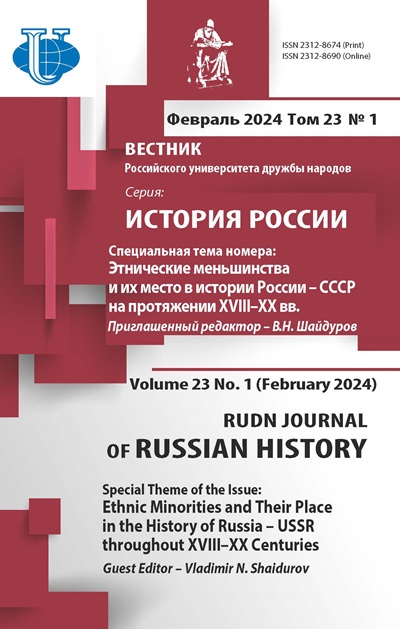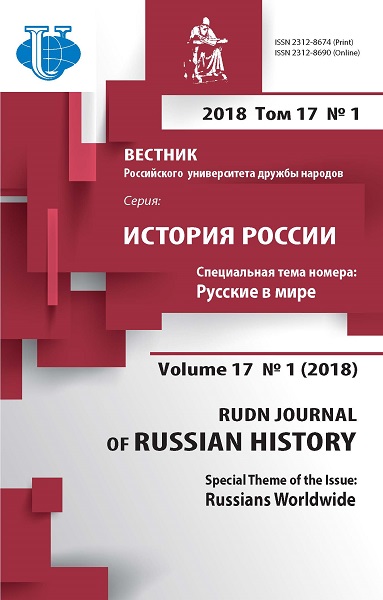Social and political life of Ingush emigrants in Europe (1920-1940)
- Authors: Chapanov A.K1
-
Affiliations:
- Russian State University for the Humanities
- Issue: Vol 17, No 1 (2018): RUSSIANS WORLDWIDE
- Pages: 198-214
- Section: ARTICLES
- URL: https://journals.rudn.ru/russian-history/article/view/18537
- DOI: https://doi.org/10.22363/2312-8674-2018-17-1-198-214
Cite item
Full text / tables, figures
Abstract
In the 20th century there were several emigration flows of the Ingush to Europe. The first mass emigration took place in the post-revolutionary period. After 1917, the centres of the social, political and cultural activities of the Ingush Diaspora were Paris, Berlin, Prague and Warsaw. In that period, most Ingush emigrants belonged to the military, political and scientific-cultural elite, which explains the high level of the social and cultural values created by them in foreign countries. It is the social and political life and the spiritual heritage of the Ingush emigrants, being abroad for certain reasons in different historical periods, which is a very interesting subject for research. The article analyzes the process of theformationoftheinstitutionalbasisoftheIngushpost-revolutionarycommunityinEurope. There is shown the role of public figures, in particular S. Malsagov and the Dzhabagiev brothers, who made a significant contribution to the development of the Ingush spiritual culture and science. The author notes that the most visible in the public and political life of the North Caucasian post-revolutionary community in Europe were the activities of the organizations and movements, which sympathized with the ideas of the Caucasus independence. As a result of the research, the author comes to the conclusion that the socio-political associations of the North Caucasian emigrants in Western Europe played a significant role in the socio-cultural adaptation of national communities of peoples of the North Caucasus abroad. Although the process of the social and cultural integration was rather difficult and long, the Ingush Diaspora preserved its national identity. The article is based on the memoirs, emigrant periodicals and electronic publications devoted to the problems of the political-legal and socio-cultural adaptation of the Ingush immigrants in Europe. In order to analyze the history of the Ingush emigrants, there are also presented unpublished documents stored in the Russian state archive of literature and art (RGALI).
About the authors
Akhmed K Chapanov
Russian State University for the Humanities
Author for correspondence.
Email: ahmed.targimov@mail.ru
выпускник кафедры всеобщей истории Ингушского государственного университета, кандидат политических наук (МГУ имени М.В. Ломоносова, 2017). Старший преподаватель кафедры истории и организации архивного дела Историкоархивного института РГГУ
6 Miusscay square, Moscow, 125993, RussiaReferences
- Babich, I.L. “Severokavkazskaya natsiya v evropeiskoi emigratsii (1917-1930-e gody): mif ili real’nost’.” [North Caucasian nation in the European emigration (1917- 1930-ies): myth or reality]. Obshchestvo kak ob”ekt i sub”ekt vlasti. St. Peterburg, 2012: 376-402 (in Russian).
- Babich, I.L. “Teoriya postroeniya gosudarstva na Sevemom Kavkaze (severokavkazskaya emigrantskaya mysl’ 1920-1930-kh godov v Evrope).” [The theory of building a state in the North Caucasus (the North Caucasian emigrant idea of the 1920s - 1930s in Europe)]. Istoriya gosudarstva iprava, no. 22-23 (2011): 41-45 (in Russian).
- Bokov, I. “Izvestnye ingushskie emigranty, ostavivshie sled v istorii.” [Famous Ingush emigrants]. Magas.ru. http://www.magas.ru/content/obnovleno-izvestnye-ingushs- kie-emigranty-ostavivshie-sled-istorii (in Russian).
- Bokov, I. “Ob ingushskoi diaspore vo Frantsii. O polkovnike Kurieve i razmyshleniya o nashei istorii.”[The Ingush Diaspora in France. Kuriev and reflection on our history]. Magas.ru. http://www.magas.ru/content (in Russian).
- Borlakova, F.A. “Karachaevo-balkarskaya emigratsiya: etapy formirovaniya i etnokul’turnoi evolyutsii.” [Karachay-Balkar emigration: stages of formation and ethno-cultural evolution]. PhD diss., Karachaevo-Cherkessky State University named afterU.D. Aliev, 2009 (in Russian).
- Dakhkil’gov, I., and Dzeitova, Kh. “G1alg1ai mettakhi bagakhbuvtsamakhi frantsuzski mettala ba’ tokhkami.” [About the Ingush language and folklore (study in French)]. Serdalo, December 18, 1990 (in Ingush).
- Dolgieva, M.B. “Obshchestvennaya mysl’Ingushetii vtoroi poloviny XlX-nachala XX vv. [Public thought of Ingushetia of the second half of the XIX-early XX centuries]. PhD diss., Kabardino-Balkarian State University named after H.M. Berbekov, 2002 (in Russian).
- Dolgieva, M.B. “Zhiznennyi put’ Vasan-Gireya Dzhabagieva.” [The Life of V.Djabagiev]. Magas.ru. http://www.magas.ru/content/zhiznennyi-put-vasan-gireya-dzhabagieva (in Russian).
- Ershov, V.F. “Institutsional’naya struktura severokavkazskogo zarubezh’ya vo Frantsii v 1920-e - 1950-e gg.” [Institutional structure of the North Caucasus emigration in France in the 1920-1950]. Armiya i obshchestvo, no. 2 (2014): 129-133 (in Russian).
- Ershov, V.F. “Severokavkazskoe zarubezh’e 1920-1930-kh gg. v Turtsii, Zapadnoi Evrope i SShA: evolyutsiya i sotsiokul’turnaya spetsifika.” [North Caucasus Emigration 1920-1930-ies. in Turkey, Western Europe and the US: evolution and socio-cultural specificity]. International Circassian Association. http://intercircass.org/?p=2688/ (in Russian).
- Ershov, V.F. Russkii mir i severokavkazskoe zarubezh’e v XX - nachale XXI veka. Moscow: INFRA-M, 2016 (in Russian).
- Ganich, A.A. Cherkesy v Iordanii: osobennosti istoricheskogo i etnokul ’turnogo razvitiya. Moscow ISAA MGU, 2007 (in Russian).
- Gorcy Kavkaza, no. 34, 35, 1933 (in Russian).
- Gosudarstvennyj arhiv Rossijskoj Federacii (thereafter -GA RF) [State archive of the Rus¬sian Federation], f. Р-5881, op. 2, d. 109.
- Guseff, K. Russkaya emigratsiya vo Frantsii: sotsial’naya istoriya (1920-1939 gody). Mos¬cow: Novoe literaturnoe obozrenie, 2014 (in Russian).
- Kazakov, A.V “Vozniknovenie severokavkazskoi politicheskoi emigratsii posle Grazhdanskoi voiny v Rossii.” [The emergence of the North Caucasian political emigration after the Civil War in Russia]. Istoricheskii vestnik, no. 2 (2005): 239-250 (in Russian).
- Mankieva, E.D. “Bibliografiya ingushskoi emigratsii (po materialam pechatnykh izdanii kavkazskoi emigratsii).” [Bibliography of the Ingush emigration (based on the materials of Caucasian emigrant periodical press]. Arkhivnyi vestnik GASRI, no. 2 (2005): 110-113 (in Russian).
- Mnukhina, L., Avril’, M., and Losskoi V. eds. Rossiiskoe zarubezh’e vo Frantsii. 1919-2000 [The Russian Expatriates in France. Biographical Dictionary. 1919-2000]. Vol. 1. Moscow, 2008 (in Russian).
- Patiev, Ya.S., ed. Ingushi: deportatsiya, vozvrashchenie, reabilitatsiya, 1944-2004: Doku- menty, materialy, kommentarii. Magas: Serdalo, 2004 (in Russian).
- Rossijskij gosudarstvennyj arhiv literatury i iskusstva (thereafter -RGALI) [Russian State Archive of Literature and Art] f. 1883, op. 4, d. 130.
- Severnyj Kavkaz, no. 41, 1933 (in Russian).
- Shkarenkov, L.K. Agoniya beloi emigratsii. Moscow: Mysl’, 1987 (in Russian).
- Tsurganov, Yu.S. Beloemigranty i Vtoraya mirovaya voina. Popytka revansha. 1939-1945. Moscow: Tsentrpoligraf, 2010 (in Russian).
- Yalkharoeva, M.A. Ingushskaya Daspora v Turtsii. Nazran’: Piligrim, 2008 (in Russian).
- Yandieva, M. “Mal’sagov Sozerko Artaganovich.” Gazavat. Ru. URL: http://www.gazavat. ru/personalies2.php?people=79 (in Russian).
- Yandieva, M.D., ed. Ingushetiya i ingushi. Nazran’ - Moscow: Novaya planeta, vol. 2, 2002 (in Russian).
- Yandieva, M.D., and Gazikov, B. Ingushskaya politicheskaya publitsistika 50-kh gg.
- V.-G. Dzhabagiev na stranitsakh zhurnala «Svobodnyi Kavkaz». Nazran; Moscow: Ingushskii “Memorial”, 2003 (in Russian).
- Yandieva, M.D., and Mal’sagov, A.A. Obshchekavkazskaya gosudarstvennost’: vchera, se- godnya, zavtra. Nazran’; Moscow: Ingushskii “Memorial”, 2003 (in Russian).
















